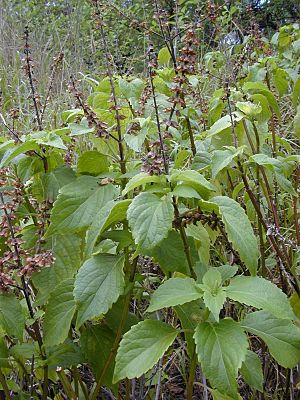African basil facts for kids
Quick facts for kids African basil |
|
|---|---|
 |
|
| Scientific classification |
|
| Kingdom: | Plantae |
| Clade: | Tracheophytes |
| Clade: | Angiosperms |
| Clade: | Eudicots |
| Clade: | Asterids |
| Order: | Lamiales |
| Family: | Lamiaceae |
| Genus: | Ocimum |
| Species: |
O. gratissimum
|
| Binomial name | |
| Ocimum gratissimum |
|
| Script error: The function "autoWithCaption" does not exist. | |
Script error: No such module "Check for conflicting parameters".
Ocimum gratissimum, often called African basil or clove basil, is a type of plant in the Ocimum family. In Hawaii, people sometimes call it wild basil. This plant originally comes from Africa, Madagascar, and southern Asia. You can also find it growing naturally in places like Polynesia, Mexico, Brazil, and the Caribbean.
Contents
What is African Basil?
African basil is a plant that smells a bit like cloves. It is used in many parts of the world, especially in cooking and traditional medicine.
Many Names for One Plant
This plant is very popular in West Africa and the Caribbean. People there use it for cooking and call it by many different local names. For example, in Nigeria, it is often known as "scent leaves." Other names include "Efirin" in Yoruba and "Nchuanwu" in Igbo.
Growing African Basil
African basil seeds usually need lots of sunlight to grow. This means they like bright, sunny places to sprout.
Special Uses of African Basil
African basil has some interesting properties. Its oil contains a substance called eugenol.
Fighting Germs
The oil from African basil can help fight against some types of bacteria. Because of this, it might be used to help keep food fresh for longer.
Keeping Insects Away
This plant is also good at keeping certain insects away. For example, it can repel tiny insects called thrips, which can harm other crops. This makes African basil a useful insect repellent for farmers.
See also
 In Spanish: Albahaca de clavo para niños
In Spanish: Albahaca de clavo para niños
 | Precious Adams |
 | Lauren Anderson |
 | Janet Collins |

